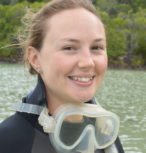DNA reveals the past and future of coral reefs
New DNA techniques are being used to understand how coral reacted to the end of the last ice age in order to better predict how they will cope with current changes to the climate. James Cook Univer

From 2005 to 2022, the main node of the ARC Centre of Excellence for Coral Reef Studies was headquartered at James Cook University in Townsville, Queensland (Australia)








Abstract: Current-day populations of coral reef fish suffer when exposed acutely to elevated temperatures, but future warming will occur over greater timescales. Recent studies show that developmental or parental exposure to higher temperature can buffer the effects of warming on reef fishes. Yet we do not know the exposure duration, timing, or sex-specific requirements to induce these plastic changes within and across generations. In my PhD, I used the coral reef damselfish, Acanthochromis polyacanthus, to determine the length of exposure to warming early in life necessary to influence fitness-related characteristics later in life. I then experimentally tested sex- and time- specific effects of warming on reproductive performance and offspring quality. I found elevated temperature experienced in the first weeks post hatching was critical to stimulate beneficial adjustments later in life, but ongoing exposure to warming created trade-offs, including a cessation of reproduction when females experienced warming their entire lives. As expected, both parents’ thermal experiences played a role in offspring performance, but interestingly fathers’ thermal experiences had the greatest impact. In nature, this could mean coral reef fish born during a marine heatwave may have enhanced performance and so too could the next generation depending on whether the mother, father, or both parents experienced the heatwave. Conversely, the lack of reproduction from an average increase in temperature would likely lead to population decline. My findings highlight the complexity of predicting the effects of ocean warming, since the duration, timing, and sex-linked experiences to warming interact, even across generations.
Biography: Rachel is a marine ecologist that draws on an evolutionary perspective to study how coral reef fishes persist in a changing climate. She has a keen interest in statistics, particularly Bayesian methods. Rachel is a PhD candidate supervised by Prof. Philip Munday and Dr Jennifer Donelson at the ARC Centre of Excellence for Coral Reef Studies. Her interest in the underwater world began in her youth, privately breeding rare fishes and working in the ornamental aquarium industry. She went on to complete a Bachelor of Marine Sc. at Macquarie University, whilst working as an environmental educator in Sydney, Australia. Rachel undertook a M.Sc. in evolutionary biology at the University of Basel in Switzerland, where she studied the adaptive radiation of cichlid fishes in the African Great Lakes. She then worked as a marine ecologist for an NGO in South Africa before embarking on her PhD.
New DNA techniques are being used to understand how coral reacted to the end of the last ice age in order to better predict how they will cope with current changes to the climate. James Cook Univer
A new study on the effects of climate change in five tropical countries has found fisheries are in more trouble than agriculture, and poor people are in the most danger. Distinguished Profess
James Cook University researchers have found brightly coloured fish are becoming increasingly rare as coral declines, with the phenomenon likely to get worse in the future. Christopher Hemingson, a
Researchers working with stakeholders in the Great Barrier Reef region have come up with ideas on how groups responsible for looking after the reef can operate more effectively when the next bleaching
Abstract: As marine species adapt to climate change, their heat tolerance will likely be under strong selection. Individual variation in heat tolerance and its heritability underpin the potential fo
Abstract: The Reef Ecology Lab in KAUST’s Red Sea Research Center explores many aspects of movement ecology of marine organisms, ranging from adult migrations to intergenerational larval dispersal
Abstract: Macroalgal meadows are a prominent, yet often maligned component of the tropical seascape. Our work at Ningaloo reef in WA demonstrate that canopy forming macroalgae provide habitat for ad
Abstract: Sharks are generally perceived as strong and fearsome animals. With fossils dating back at least 420 million years, sharks are not only majestic top predators but they also outlived dinosa
Abstract: Connectivity plays a vital role in many ecosystems through its effects on fundamental ecological and evolutionary processes. Its consequences for populations and metapopulations have been
Abstract: Evolution of many eukaryotic organisms is affected by interactions with microbes. Microbial symbioses can ultimately reflect host’s diet, habitat range, and even body shape. However, how
Abstract: The past few years have seen unprecedented coral bleaching and mortality on the Great Barrier Reef (GBR) but the consequences of this on biodiversity are not yet known. This talk will expl